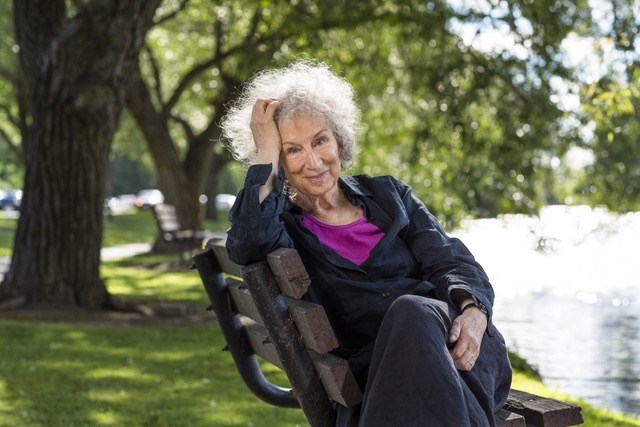In the mid-1950s, Joe Kronick was scrambling to turn an old lodge on Hurricane Lake into a summer camp in Ontario’s Haliburton Highlands.
He knew that his cousin lived next door to the Atwood family in Toronto. Carl Atwood was a forest entomologist who frequently took his teenaged daughter Peggy on excursions into the back woods of Northern Ontario.
Would his cousin be willing, Kronick asked, to knock on the Atwoods’ door to see if Peggy would be willing to lead the nature program at Camp White Pine?
“Joe was introducing urban kids to nature so they weren’t scared of things,” Peggy — now known to the world as the Nobel-nominated writer Margaret Atwood — told the Courier during an interview at the 27th International Ornithological Congress.
Because Atwood also felt it was important for children to “see what the world is like outside the boxes we put them in,” she agreed to help out.
“Peggy Nature,” as she was tagged at camp, was born.
British Columbia does not have as much of a history of summer camps but in Ontario they remain one of the quintessential experiences of childhood. Sleeping in tents or rustic cabins, campfires, canoeing, singing silly songs — camp is an indelible awakening to the natural, unstructured and largely unfettered environment that is “the great outdoors.”
When I was a child, parts of my summers were spent at Camp Adelaide, also in Haliburton, first as a Brownie and then as a Girl Guide. It was the place I cooked my first aluminum-foil-and-wet-newspaper-covered roast in an underground oven made with leftover coals from the morning breakfast and spent afternoons learning how to dip, dip and swing my paddle.
After getting my journalism degree at Ryerson Polytechnical Institute, I returned to Haliburton, this time as a reporter at the Haliburton County Echo.
If you were to mention Haliburton to someone who grew up in Ontario, they’d likely either say, “I went to camp there” or “we had a cottage there.” With its hundreds of lakes, there are dozens of camps in the county, although there are fewer now that high real estate prices make it more enticing to turn waterfront acreages into cottage properties. (Camp Adelaide may one day suffer the same fate.)
I’d known that Atwood had spent three summers at Camp White Pine and yearned to interview her about it. However, by this time she was the celebrated author of books such as Surfacing, The Handmaid’s Tale, Cat’s Eye and the Booker Prize-winning The Blind Assassin. Snagging an interview was not an easy feat.
Not surprisingly, I leapt at the opportunity to ask her about Camp White Pine at an August 21 media event as part of the International Ornithological Congress being held at the Vancouver Convention Centre.
Perhaps even more passionate now about the need to expose children to outdoor experiences, Atwood gamely agreed to turn her attention away from saving birds by keeping cats indoors and go back in time to those teenaged summers.
Kronick promised her a classroom but she ended up working out of a toolshed. Joining her at the camp were three people whose friendships lasted years and led to future collaborations: artist Charles Pachter, writer Rick Salutin and filmmaker Beryl Fox. (David Shore, the creator of the House television series, is also an alumni. The camp itself became famous when Meatballs was filmed there.)
Pachter has said that if you want to know what Peggy Nature looked like in those days, imagine a Canadian version of Jane Goodall: “rubber boots, shorts, maybe even a machete at the side, ‘shata’ on her head.”
Long before we gave fancy names to simple pursuits — I’m thinking of you, forest bathing — parents weren’t afraid of letting their children loose — with camp counsellor supervision — in the woods and lakes.
“It was very improvisational and quite fun,” she says.
She references E.O. Wilson, the Pulitzer Prize-winning author and entomologist who talks about children’s innate curiosity about the world around them and why it’s so important to give them opportunities to get out and explore.
“If you watch young children in nature,” Atwood says, “they have a natural interest in anything alive.”
Long live Camp White Pine.



